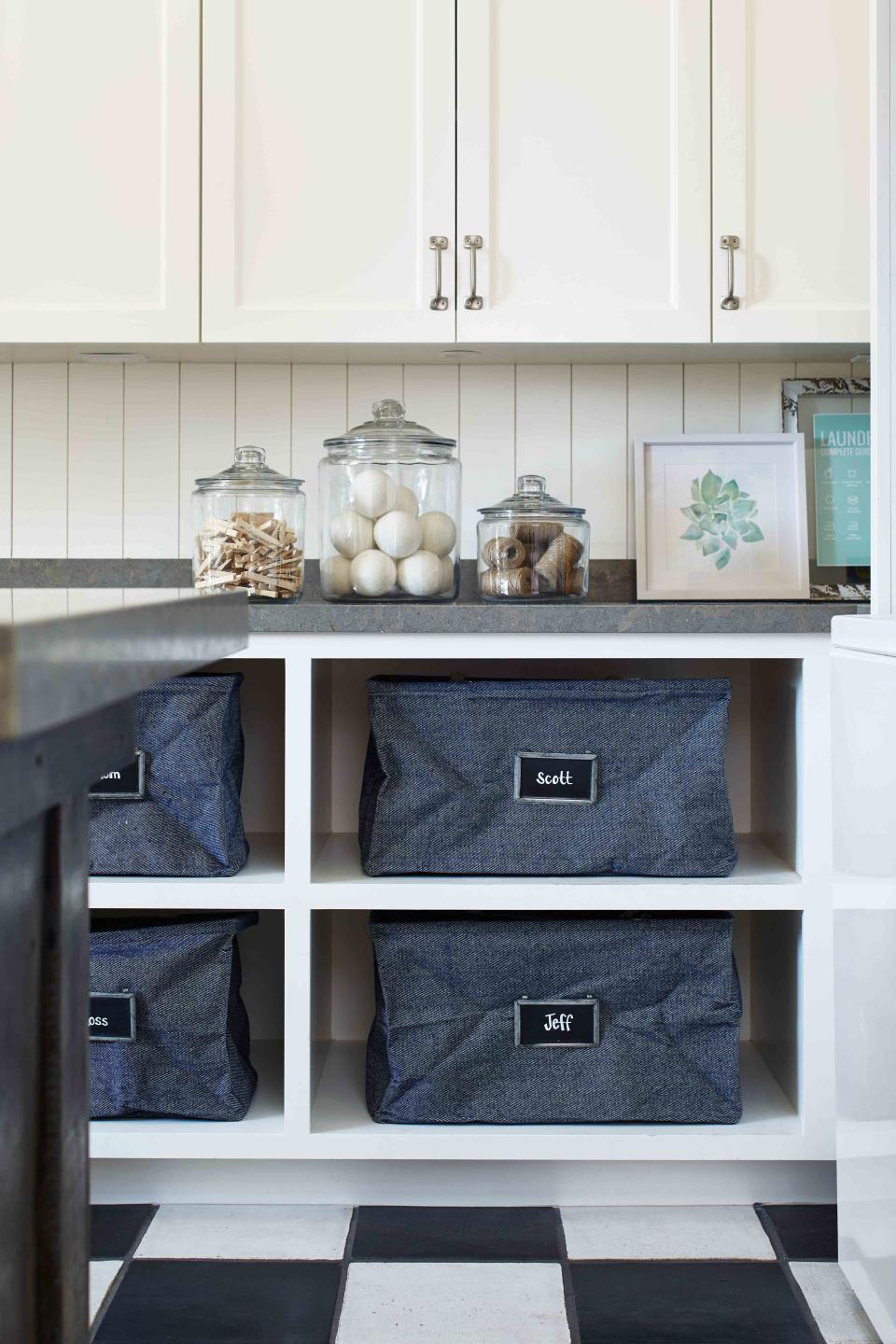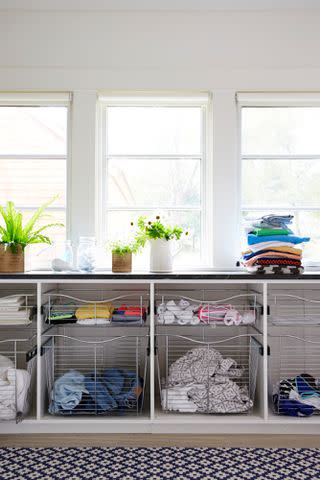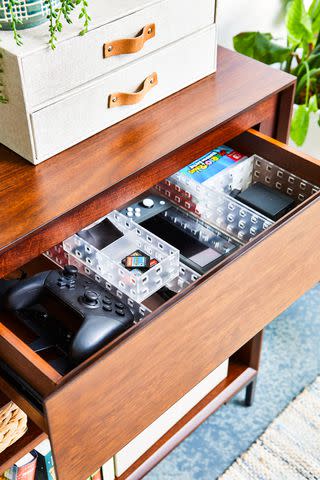12 Things You Should Never Store in the Basement
Avoid placing these things in the basement at all costs in order to keep them safe.

LAURA MOSS
Owning a house with a basement seems like a luxury to anyone who lacks adequate storage. While it’s true it can provide much-needed space for the things you don’t use every day (such as suitcases or specialty serveware), it shouldn’t be used as a dumping ground for anything and everything. Aside from potentially creating a cluttered mess, blindly tossing items downstairs can also cause irreparable damage to them.
From the risk of flooding and pests to the fluctuating temperature and humidity, basements can be quite precarious. Here’s a list of things you should never store in the basement (with alternative storage ideas) so you can protect your stuff, your space, and your sanity.
Related: Is Finishing Your Basement Better for Resale Value?
1. Perishable Food
The first item on the list is paramount, especially if you’re squeamish about pests. Insects or, perhaps worse, rodents can smell food and make their way into flimsy plastic or paper packaging. In addition, food can spoil quicker in unregulated conditions. In a similar vein, avoid storing vitamins, medicine, and supplements downstairs. And, as you may know, wine should be stored at certain temperatures and humidity levels, so a basement varies too much to confidently keep bottles there until you’re ready to open them.
Now, some food might be OK to store in the basement so long as it’s airtight, such as if you’re canning vegetables or have goods stored in sealed, lidded containers. Otherwise, you’re better off creating a freestanding pantry in the kitchen or maximizing the space you already have.
2. Pet Supplies
Similarly to human food, dog, cat, or any other type of pet food should not be stored in the basement as pests can take up home inside the packages. Additionally, kitty litter can begin to clump due to excess moisture.
Instead, aim to store food and litter in a temperature-controlled area such as the kitchen, an upstairs laundry room, or even a mudroom.
Related: 11 Smart Storage Solutions for Your Pet Supplies

David A Land
3. Fragile Fabrics
Any sentimental items such as baby clothes, stuffed animals, or wedding gowns, or pieces made of fur, leather, and suede should not be kept in the basement as they’re highly susceptible to mold and mildew. It’s possible to store some clothing, such as off-season items (depending on the material) downstairs. They should be sealed in bins, properly labeled, and placed on shelves at least a few feet from the floor. This is to prevent them being damaged if flooding does occur and from being exposed to moths and dust mites.
In reality, your best bet is to steer clear of keeping any fabrics, including casual clothing, in the basement especially if it’s unfinished. Instead, try to declutter as much as possible, be smart with closet storage, or employ under-the-bed containers.
4. Bedding
In keeping with the fabric theme, any and all extraneous bedding shouldn’t be put downstairs for similar reasons as clothing. Pillows, blankets, sheets, and even slumber bags left exposed to elevated moisture levels will most likely get mildewy. Plus, if some of these are the linens being used for occasional guests, you wouldn’t want them sleeping on something that smells like a basement, would you?
Exactly, and so, just like you would for clothing, focus on decluttering what you don’t need and then efficiently organize the linen closet upstairs or utilize a storage bench for extra bedding. If you have an extra mattress, learn how and where to properly store it, even if it might mean investing in a climate-controlled storage unit.
Related: How to Store a Mattress
5. Toys
Even if they’re not sentimental or made of fabric, avoid storing toys in a basement that is subject to changing temperatures. Metal toys can rust and plastic or wood can gather mildew stains on account of the excessive moisture.
At the risk of sounding like a broken record, work on paring down the toys your child no longer plays with to cut down on the need for extra storage space. If you’re saving some for the younger ones or using a toy-swapping method, bin some up and store them on shelves in a playroom or a bonus room upstairs.
Related: Playroom Storage Ideas to Help Keep Your Kids' Space Clutter-Free
6. Anything Made of Paper
The dampness in a basement can be the kiss of death for paper. Not only will paper attract mold and mildew, it’ll become discolored (usually yellowed) and illegible over time. So, it’s highly recommended to keep paperwork, photographs, books, magazines, newspapers, and loose artwork (whether it’s professional or from your crafty child) out of the basement altogether. Cardboard boxes are a no-go as well as they will deteriorate and can even become a snack for unwanted pests.
Try some of these ideas instead:
Go as paperless as possible and for important items, like tax returns or insurance docs, organize the paperwork into a small filing cabinet in an office space or the kitchen.
Keep essential documents such as birth, death or marriage certificates, divorce decrees, passports, house deeds, car titles, and more in a fireproof safe where you can grab it quickly in the event of an emergency.
Organize your photo collection (and consider scanning them digitally for extra security) and keep them in boxes or albums in the family room for all to enjoy.
Donate any reads you no longer want and then get creative with book storage in other areas of the house.
Have fine art framed and hung in the house or make a kid’s gallery in the playroom and then discard or bin up old work with mementos.
7. Mementos
If it’s something that is irreplaceable to you, it’s best to leave it out of the basement. Mementos can encompass high school t-shirts, letters or cards, photos, medals, memorabilia, family heirlooms, and so much more. In the event of a disaster, such as the basement flooding, these can be lost for good.
Put your mind to ease and store them safely elsewhere in the house. Use pretty containers with labels to hold your items and place them on a high shelf in a closet so that they’re out of the way. You can also get creative and display some mementos, such as by adding them to a shadow box.
8. Furniture and Home Decor
Anything made of wood can easily warp or crack in a high-humidity basement so abstain from leaving extra furniture down there. This is exceptionally important if you have antique or heirloom pieces that need a temporary home. Rugs, just like all fabrics, will be vulnerable to moisture damage. As tempting as it may be to toss an extra one in the basement, it’s probably not the best idea in the long run.
Rather, roll it up, store it in a plastic bag, and keep it upright in another area such as a spare bedroom closet. Find a spot upstairs to display vintage furniture or decor, make use of a storage unit, or ask a relative to hold it for you if it’s only a short-term solution
9. Firewood
High levels of moisture can actually rot and spoil the wood, which is a shame as it can be costly depending on your area and the time of year.
Come up with other firewood storage ideas such as making space for it in the living room or outside in the shed.

10. Electronics
Even if you haven’t used the DVD player in years - and think you might pull it out again someday - there’s no point in putting it in the basement. Oscillating temperatures and humidity can easily corrode electronics, deeming them unusable in the future.
Instead, make room in a TV console, coffee table, or home office closet and organize the electronics that you still reach for from time to time. And for anything you’ll never use again because they’re broken or obsolete, find a local electronics recycling center that will take them off your hands.
Related: How to Get Rid of Practically Anything
11. Batteries
Just like electronics, batteries can become eroded after being subjected to moisture for periods of time. They can release harmful gases if exposed to it for too long and can even explode if the conditions become too hot. So, whether you have backup batteries or they’re currently in electronics, it’s a good idea to keep them out of the basement entirely.
You can safely store batteries in other areas of the house as long as it’s kept at a cool, dry temperature. It’s also wise to invest in an organizer that’s designed specifically for batteries that also tests their life span.
12. Flammable or Hazardous Chemicals
It’s all too common to leave half-empty cans of primer or bulk cleaning supplies in the basement for whenever you need them next. You might want to rethink that, especially if you have a heating source down there as well. Anything that’s flammable, from paint to propane, should be kept far away from a water heater, furnace, or even the dryer if your basement doubles as a laundry room. Much like batteries, chemicals can leak and release hazardous fumes if they’re not kept in a well-ventilated area and combustible liquids or gases may explode if the container gets too hot.
How should you handle these items then? While you can technically store paint in the basement, do it properly and make sure it’s in an open space away from any heat. You can do the same with cleaning products, particularly if your basement maintains a more low-temperature and humidity level year-round. However, you might want to instead consider replacing commercial cleaners with non-toxic products or place what you have in an organized cleaning closet upstairs. Use a high shelf in the garage or shed to store pesticides, fertilizers, pool chemicals, and gas cans.
Related: How to Safely Store Cleaning Supplies
For more Better Homes & Gardens news, make sure to sign up for our newsletter!
Read the original article on Better Homes & Gardens.

